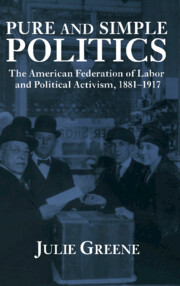Book contents
2 - The Revolt Against Party Slavery
Published online by Cambridge University Press: 31 August 2009
Summary
Some Gilded Age workers lived amidst a heady swirl of political opportunities. Whether they chose soldierlike loyalty in the ranks of the major parties or alternatives like socialism, greenbackism, populism, or anarchism, workingmen regularly asserted their wish to influence the future of American society and government. Yet as a group, workers also faced severe limitations on their political influence. The conservative nature of the major parties, institutional discrimination against third parties, and ethnic divisions that made some workingmen Democrats and others Republicans, all placed obstacles in front of even those most empowered workers, the white men possessing citizenship. Far more striking was the way America's political system victimized female, Asian, and (in most cases) Native American and African-American workers through disfranchisement. European immigrants lacked the franchise until they became citizens, and for many of them, voting continued to seem unattractive even after that. These barriers extinguished any possibility that American workers could become a united political force during the Gilded Age.
Like the working class from which it sprang, the American Federation of Labor was pervaded by political debate during its early decades. Many among the AFL's skilled craftsmen agitated as part of the single-tax, socialist, or populist movements. Others supported the Democratic or Republican parties. By the 1890s, though, a bitter fight had erupted among AFL members over which political strategy the labor movement should pursue. Should trade unionists emphasize economic or political activity? And if the latter, should they ally with a political party or remain independent?
- Type
- Chapter
- Information
- Pure and Simple PoliticsThe American Federation of Labor and Political Activism, 1881–1917, pp. 48 - 70Publisher: Cambridge University PressPrint publication year: 1998



